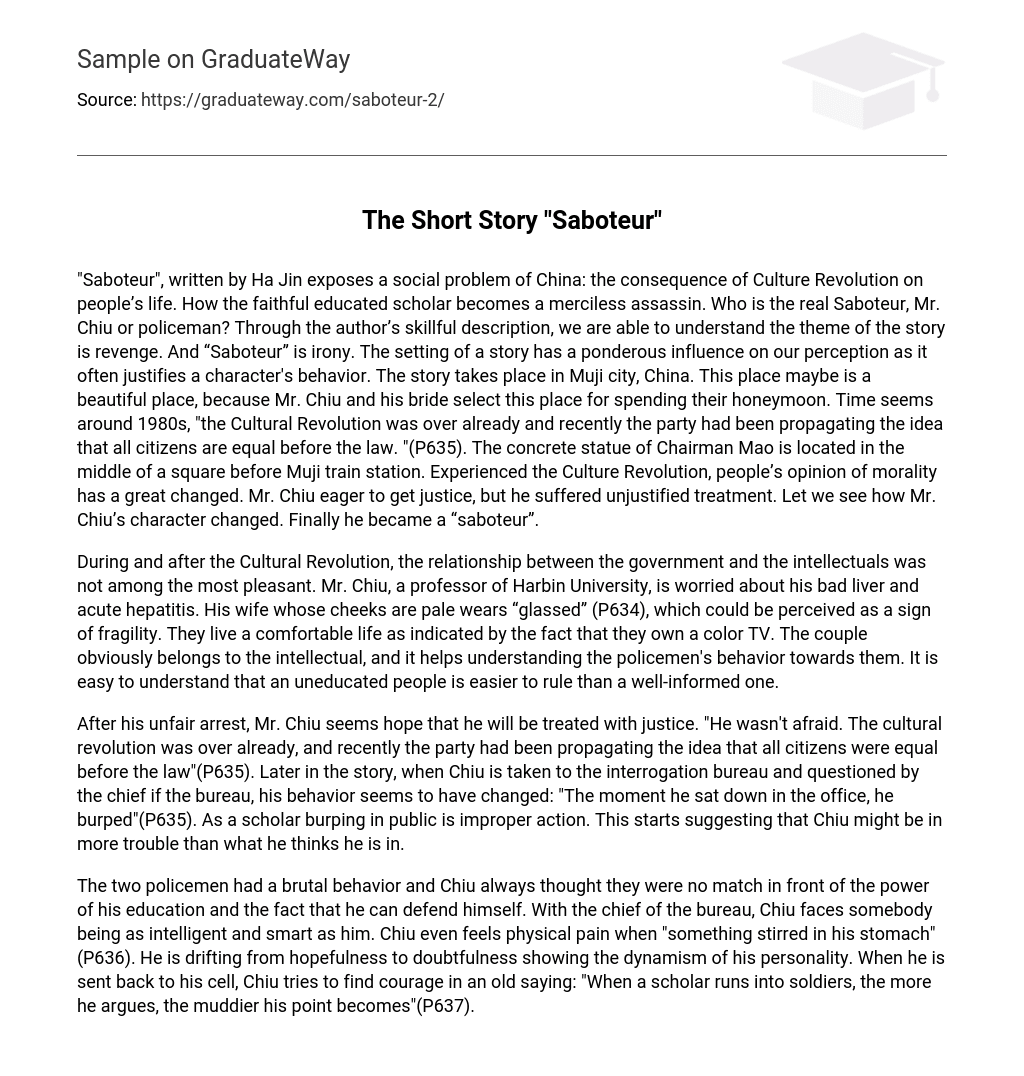“Hau Jin’s “Saboteur” addresses the impact of China’s Cultural Revolution on individuals’ lives, highlighting how a once loyal and educated scholar transforms into a merciless assassin. The story explores the theme of revenge and utilizes irony. Set in Muji city, China, during the 1980s after the Cultural Revolution, the narrative exemplifies how the setting influences character behavior. Mr. Chiu and his bride choose Muji city as their honeymoon destination, likely due to its beauty. However, the revolution greatly alters people’s perceptions of morality. While Mr. Chiu initially seeks justice, he ultimately succumbs to becoming a “saboteur.” The story emphasizes the consequences of the Cultural Revolution on individuals and society.”
During and after the Cultural Revolution, the government had a strained relationship with intellectuals. Mr. Chiu, who is a professor at Harbin University, is worried about his liver deteriorating and his acute hepatitis. His wife, who looks weak with pale cheeks, wears glasses that can be seen as a symbol of vulnerability. Despite their difficulties, the couple enjoys a comfortable life, which is evident from their possession of a color TV. Their status as intellectuals reveals how the police treat them differently. It is obvious that it is easier to control an uneducated population compared to an informed one.
Despite being unjustly arrested, Mr. Chiu remains optimistic about receiving fair treatment. He is not afraid because the cultural revolution has concluded and the party has emphasized equality before the law (P635).
However, upon arriving at the interrogation bureau, Chiu’s demeanor appears to have shifted. During questioning by the bureau’s chief, he unexpectedly burps in the office. This behavior is deemed inappropriate for a scholar and raises concerns that Chiu may be confronting greater difficulties than he originally anticipated (P635).
Both policemen displayed brutal behavior, which led Chiu to believe they were no match for his education and his ability to defend himself. However, when faced with the chief of the bureau, Chiu encounters someone equally intelligent and astute. This encounter evokes physical pain within Chiu, as described by the sensation of something stirring in his stomach. This shift from hopefulness to doubtfulness demonstrates the dynamic nature of his personality. Upon returning to his cell, Chiu seeks solace in an old saying that highlights the futility of arguing with soldiers as a scholar, as it only leads to confusion.
We can also witness his transformation. This occurrence also foretells and justifies Chiu’s eventual response. While he rests in his prison cell, Chiu’s anger intensifies and he believes that “those hoodlums had bitten off more than they could chew” (P637). The scholar is already contemplating revenge, highlighting his character’s dynamism once again. His health declines as he catches sight of his former student in the courtyard and he is overwhelmed with a feeling of sickness (P638). Initially, Chiu had refused to sign his self-criticism because he had hope in the fairness of the system and was convinced of his innocence.
However, once he realizes that his fate and the fate of his lawyer rely on this document, he loses hope and signs it. We can empathize with the anger felt by the scholar when he was eventually released. Chiu is so enraged that he claims he would destroy the entire police station along with their families (P639). This particular incident marks Chiu’s behavioral shift, as he resolves to take action (P639). The main character decides to inflict suffering upon the townspeople by spreading Hepatitis in a vengeful frenzy. According to his lawyer, Chiu’s face appears “jaundiced” and he transforms into an “unattractive man” (P640).
This passage illustrates the transformation of the scholar into a morally corrupted individual. Sabotage, which refers to intentional damage to machinery, is deemed by Chiu as the act of the policemen who disrupt the social order. However, Chiu himself ultimately becomes a saboteur when he infects eight hundred innocent people with Hepatitis, resulting in the deaths of six individuals, including two children. The reader also witnesses the protagonist’s anger as he tries to control his fury. Mr. Chiu’s words “let me look at that” (639) and his repeated expression “if only I could kill these bastards” (P640) reflect his desire for revenge. The central theme of the story revolves around seeking vengeance.





